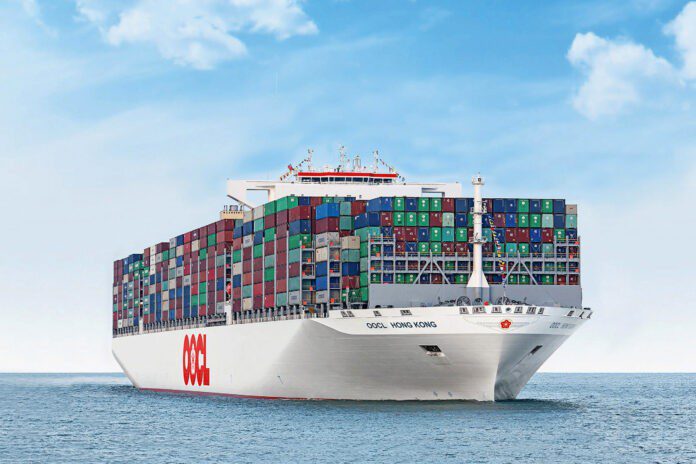US President Joe Biden says the world’s largest ocean carriers raised container shipping rates 1,000% last year. Photo from OOCL
-
House of Representatives pass Ocean Shipping Reform Act by a vote of 369-42
-
President Joe Biden will study the measure and is looking forward to signing it
-
The legislation broadens FMC’s power to address unfair business practices by ocean carriers and marine terminal operators
US President Joe Biden is expected to sign into law shortly the Ocean Shipping Reform Act of 2022 following its passage by the US House of Representatives on June 13.
The first major overhaul of regulations governing container trades in the United States since 1998 was approved by the House by a vote of 369-42. The legislation is the Senate’s version of a reform billpassed by the House last December.
Biden was elated after receiving news that Congress had approved the bill, which seeks to curb ocean carriers’ high shipping rates and unfair practices that, he said, have contributed to rising costs for the American people. “I look forward to signing it into law,” Biden said.
“Lowering prices for Americans is my top priority, and I applaud the Congress for passing the Ocean Shipping Reform Act on a bipartisan basis, which will help lower costs for American retailers, farmers and consumers,” Biden said.
He thanked Senators Amy Klobuchar (D-Minnesota) and Senator John Thune (R-South Dakota) as well as Rep. John Garamendi (D-California) and Rep. Dusty Johnson (R-South Dakota) who pushed forward for forward the legislation.
Garamendi, who authored the House version of the OSRA, broke the news on Twitter on Monday night (Tuesday RP time), then posted an update on Facebook on Tuesday.
“My bipartisan Ocean Shipping Reform Act to address supply chain and inflation issues by cracking down on unfair practices in the global shipping industry passed Congress last night. I’m joining Speaker Pelosi and my colleagues in the House to formally send my bipartisan bill to President Biden so he can sign it into law.”
Biden, in his “State of the Union” address on March 1, called on Congress to address the giant shipping companies’ high prices and unfair practices, saying “these are a major contributing factor to increased costs for American families”.
He said during the COVID-19 pandemic, ocean carriers raised rates by as much as 1,000% while refusing to take US exports back to Asia, leaving with empty containers instead.
“That’s costing farmers and ranchers – and our economy – a lot of money,” the President said on June 13.“This bill will make progress reducing costs for families and ensuring fair treatment for American businesses – including farmers and ranchers. I look forward to signing it into law.”
The legislation broadens the powers of the Federal Maritime Commission to address unfair business practices by ocean carriers and marine terminal operators.
The commission has gained support from a wide array of associations, including the National Industrial Transportation League, Agriculture Transportation Coalition, American Association of Port Authorities, National Retail Federation, American Trucking Associations, and the Harbor Trucking Association.
“The passage of OSRA is the result of five years of intensive efforts by US agriculture exporters and importers to gain effective control over out-of-control ocean carrier practices,” FreightWaves quoted Peter Friedmann, AgTC’s executive director, in a report.
“But it is not a culmination. It is the beginning of the next steps in which the FMC increases its role as the agency Congress has empowered to protect and advance the interests of the US shipping public.”
The40-page Senate billpassed on Monday had increased from its initial 17 pages when it was introduced in February afterSenate inserted additional provisions in March. The legislation’s provisions, among other things, will:
- Prohibit ocean carriers from unreasonably declining shipping opportunities for US exports, as determined by the FMC in new required rulemaking
- Shift the burden of proof regarding the reasonableness of detention or demurrage charges from the invoiced party to the ocean carrier.
- Require ocean common carriers to report to FMC each calendar quarter on total /export tonnage and 20-TEUs (/empty) per vessel that call US.
- Establish new authority for the FMC to register shipping exchanges.
The legislation boosts the FMC’s funding level from US$32.9 million in 2022 to US$49.2 million in 2025 to help the agency fire more staff to monitor the container trades.
“This bill provides needed and overdue updates to the laws the Federal Maritime Commission enforces,” commented FMC Chairman Daniel Maffei.“These changes will have a beneficial effect on how US shippers are served and will bring more accountability to how ocean cargo services are provided..”
The World Shipping Council, represents the largest container line operators, said it looks forward to engaging with the FMC to help implement OSRA’s provisions.
“We are appalled by the continued mischaracterization of the industry by US government representatives and concerned about the disconnect between hard data and inflammatory rhetoric,” WSC said in a statement.
“The increased rate levels we have seen over the past years are a function of demand outstripping supply and landside congestion, exacerbated by pandemic-related disruption. Until the import congestion is remedied, export congestion will persist.”






